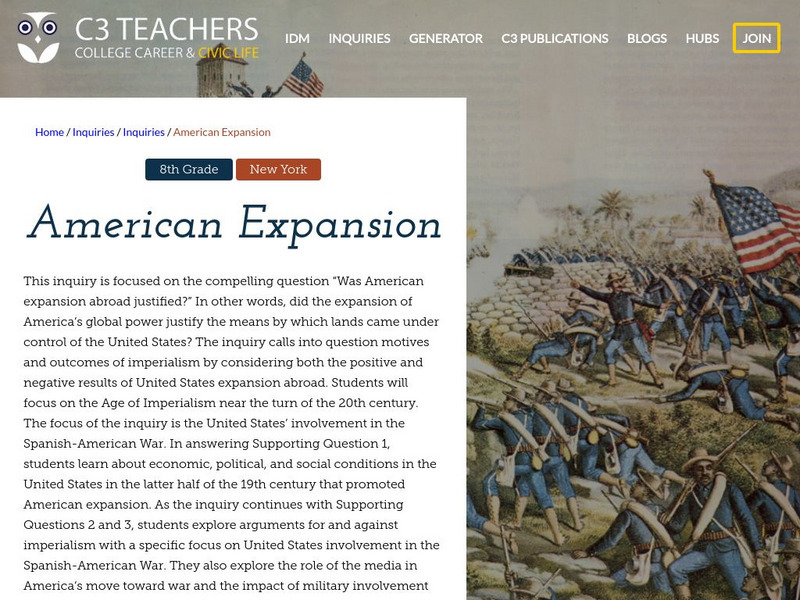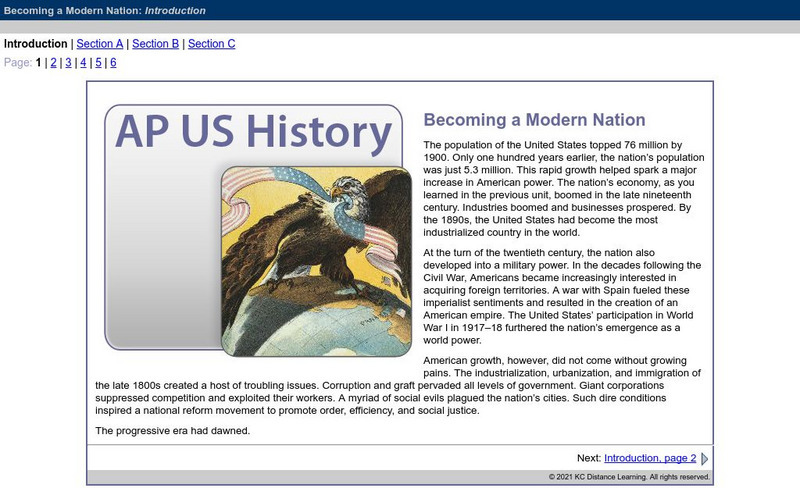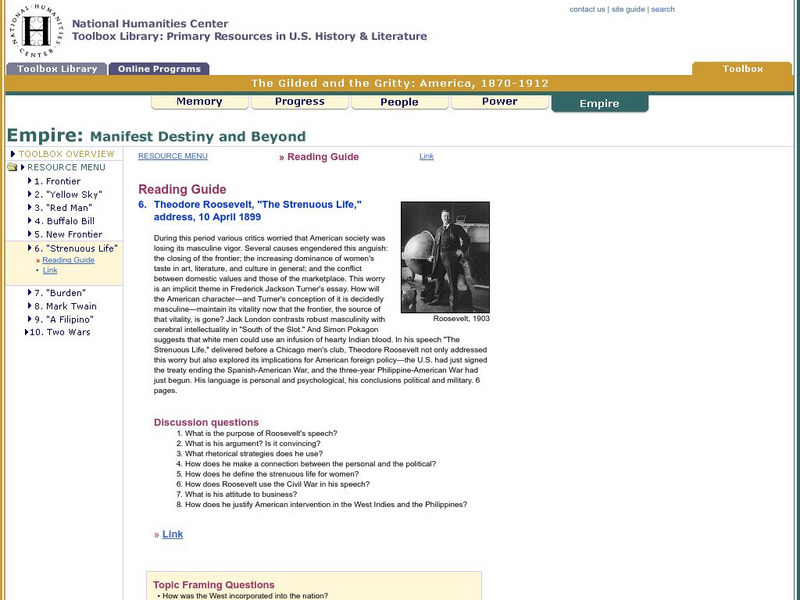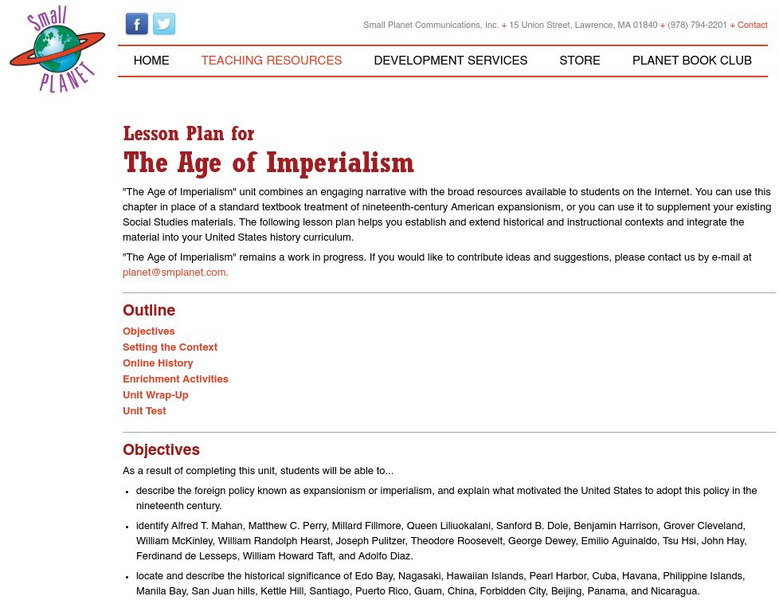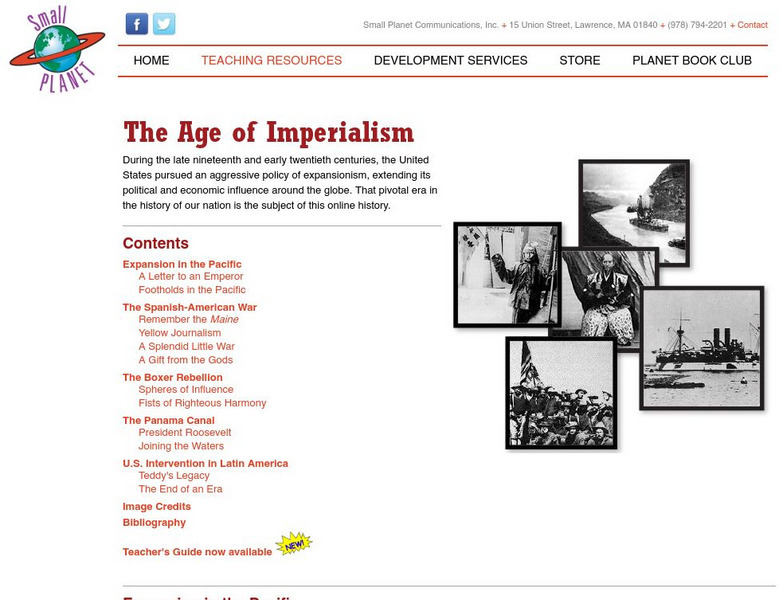OpenStax
Open Stax: American Foreign Policy 1890 1914: Turner, Mahan, and Roots of Empire
Examines the development of American foreign policy in the latter part of the 1800s, and what Frederick Jackson Turner and Alfred Thayer Mahan did to further American imperialistic interests.
C3 Teachers
C3 Teachers: Inquiries: American Expansion
A learning module on American imperialism that includes three supporting questions accompanied by formative tasks and source materials, followed by a summative performance task. Topics covered include the conditions in the late 19th...
Stanford University
Sheg: Document Based History: Reading Like a Historian: American Imperialism
[Free Registration/Login Required] The American Imperialism Unit covers the Spanish-American War and the Philippine-American War. The lessons approach historical inquiry from different angles. One asks students to consider contrasting...
Gilder Lehrman Institute of American History
Gilder Lehrman Institute: History Now: Empire Building
[Free Registration/Login Required] A lengthy essay about American focus on foreign affairs after the Civil War, expanding particularly in the late 19th century. Read about U.S. exploits in the Caribbean, Latin America, and the Pacific...
Department of Defense
Do Dea: Ap Us History: Unit 6: Becoming a Modern Nation
This extensive learning module examines the role of large-scale industrialization, urbanization, and mass migrations in creating new demands on government and social organizations to design reforms, and looks at the global and domestic...
National Humanities Center
National Humanities Center: Toolbox Library: Manifest Destiny and Beyond: Theodore Roosevelt and the Strenuous Life
Theodore Roosevelt's speech to a Chicago men's club in which he advocates a vigorous and assertive relationship between America and other parts of the world.
National Humanities Center
National Humanities Center: Toolbox Library: "Burden," the Gilded and the Gritty: America, 1870 1912
This site includes poems and editorials, some of which that praise, others that harshly condemn what Rudyard Kipling asserted was the "White Man's Burden."
Digital History
Digital History: Three Theories Explaining Imperialism [Pdf]
Read about three theories of Imperialism and how actions by the United States in the late 19th and early 20th centuries were driven by one or perhaps all three of the theories.
University of Groningen
American History: Outlines: Ambivalent Empire
Overview of U.S. domestic, foreign and colonial policy during an era of U.S. expansion and imperialism.
Schools of California Online Resources for Education
Score: White Man's Burden
Teachers: Lesson from SCORE that explores the Expansionist/ Anti-Imperialist debate at the turn of the century. Organized as a U.S. history unit, content includes information about the debate, as well as numerous resources, online...
Raleigh Charter High School
Mrs. Newmark's Page: Imperialism
This quiz will test your knowledge about imperialism.
Other
Small Planet Communications: The Age of Imperialism
This website gives detailed information on U.S, imperialism including lesson plans. Presented in outline format.
Other
On Line History of the United States: The Age of Imperialism
Online history page containing numerous links to specific incidents of U.S. expansion in the Pacific, Latin America, China, and Cuba.
Quia
Quia: The Age of Imperialism
Jeopardy-style quiz game that tests your global knowledge of the Age of Imperialism (1870-1914). A fun way of learning!
Khan Academy
Khan Academy: Ap Us History: 1890 1945: Introduction to the Age of Empire
Discusses the transition of the United States in the late 19th century from an isolationist country into an imperial power with colonies of its own and the reasons for this abrupt change in foreign policy. Includes questions for students...
Country Studies US
Country Studies: Ambivalent Empire
With the purchase of Alaska in 1867, the United States embarked on the road of building an empire. From Alaska to the Spanish-American War to the Philippine Islands, the U.S. grew as an imperial nation throughout the latter half of the...
Internet History Sourcebooks Project
Fordham University: Modern History Sourcebook: Albert Beveridge
This site from the Fordham University provides the text of 1898 campaign speech of Senator Albert Breveridge expressing his support of U.S. imperialism.
Independence Hall Association
U.s. History: Early Stirrings
American desire for overseas expansion began as early as the purchase of Alaska from Russia. See what other actions were taken in the latter part of the 19th century, and find out why this imperialist view was taking hold.
Independence Hall Association
U.s. History: Seeking Empire
A brief overview of the idea of expansion of the United States overseas in the last part of the 19th century and the early 20th century.



